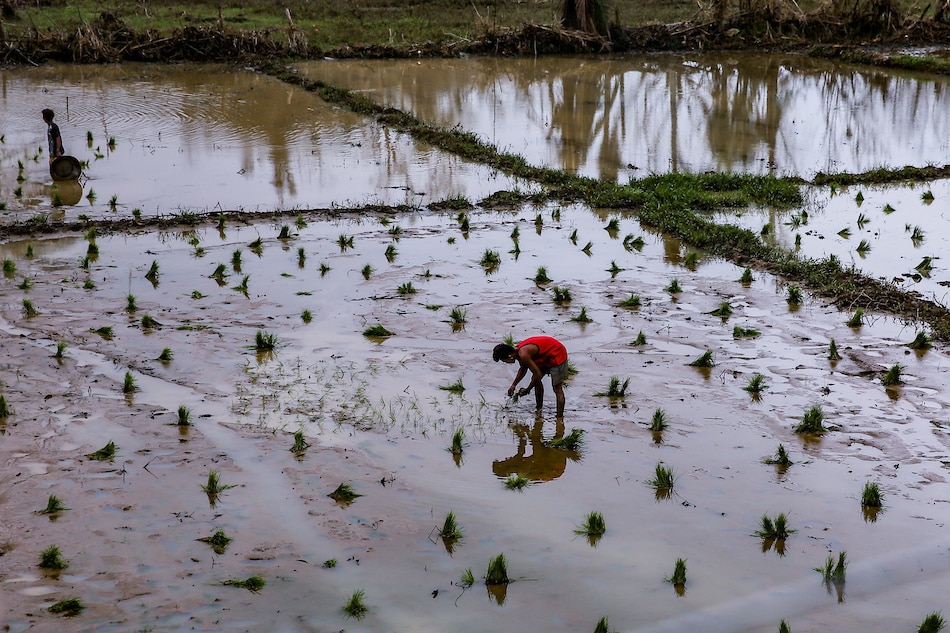Marcos OKs Masagana rice program to boost support to farmers, production | ABS-CBN
ADVERTISEMENT

Welcome, Kapamilya! We use cookies to improve your browsing experience. Continuing to use this site means you agree to our use of cookies. Tell me more!
Marcos OKs Masagana rice program to boost support to farmers, production
Marcos OKs Masagana rice program to boost support to farmers, production
Job Manahan,
ABS-CBN News
Published May 31, 2023 08:59 PM PHT
MANILA — President Ferdinand Marcos, Jr. on Wednesday agreed to the implementation of the Masagana Rice Industry Development Program (MRIDP), which was seen to prioritize the welfare of farmers and boost rice production.
MANILA — President Ferdinand Marcos, Jr. on Wednesday agreed to the implementation of the Masagana Rice Industry Development Program (MRIDP), which was seen to prioritize the welfare of farmers and boost rice production.
In a statement, Malacañang said the program would help achieve "the highest possible rice sufficiency level."
In a statement, Malacañang said the program would help achieve "the highest possible rice sufficiency level."
Among its strategies are climate change adaptation, farm clustering and consolidation or convergence of intervention, value chain approach, and digital transformation.
Among its strategies are climate change adaptation, farm clustering and consolidation or convergence of intervention, value chain approach, and digital transformation.
“They have a possibility to expand, to go into other economic activities, sa agriculture or not. But to give them more opportunities. That’s the whole point. As much as possible, we will support the farmers,” Marcos said during his meeting at the National Irrigation Administration (NIA).
“They have a possibility to expand, to go into other economic activities, sa agriculture or not. But to give them more opportunities. That’s the whole point. As much as possible, we will support the farmers,” Marcos said during his meeting at the National Irrigation Administration (NIA).
ADVERTISEMENT
The President, who concurrently holds the agriculture portfolio, said "consolidation is key."
The President, who concurrently holds the agriculture portfolio, said "consolidation is key."
This will lead, he said, to pooling of resources, funding, and technology and could be made available to farmers.
This will lead, he said, to pooling of resources, funding, and technology and could be made available to farmers.
"That really is the first step. We cannot do all of the other things that we want to do hanggang ma-organize natin ang mga farmers natin,” he said.
"That really is the first step. We cannot do all of the other things that we want to do hanggang ma-organize natin ang mga farmers natin,” he said.
In a chance interview with reporters, Marcos said it was important to tap the private sector in this convergence shift so they could partner with the cooperatives and individual farmers.
In a chance interview with reporters, Marcos said it was important to tap the private sector in this convergence shift so they could partner with the cooperatives and individual farmers.
Farm consolidation, he said, can also lead to full advantage of new technologies and entice younger farmers to come to the sector.
Farm consolidation, he said, can also lead to full advantage of new technologies and entice younger farmers to come to the sector.
"Napag-usapan din natin speaking of new technologies is bringing down the average age of the Filipino farmer. And to do that again, we engage them with new technologies because they will be the ones who will operate those systems, those new technological systems," he said.
"Napag-usapan din natin speaking of new technologies is bringing down the average age of the Filipino farmer. And to do that again, we engage them with new technologies because they will be the ones who will operate those systems, those new technological systems," he said.
In 2022, data from the agriculture department showed the top five highest rice-producing regions were Central Luzon with 3.62 million metric tons, Cagayan Valley with 2.93 million metric tons, Western Visayas with 2.32 million metric tons, Ilocos Region with 1.96 million metric tons, and Bicol Region with 1.33 million metric tons.
In 2022, data from the agriculture department showed the top five highest rice-producing regions were Central Luzon with 3.62 million metric tons, Cagayan Valley with 2.93 million metric tons, Western Visayas with 2.32 million metric tons, Ilocos Region with 1.96 million metric tons, and Bicol Region with 1.33 million metric tons.
RELATED VIDEO:
RELATED VIDEO:
ADVERTISEMENT
ADVERTISEMENT



